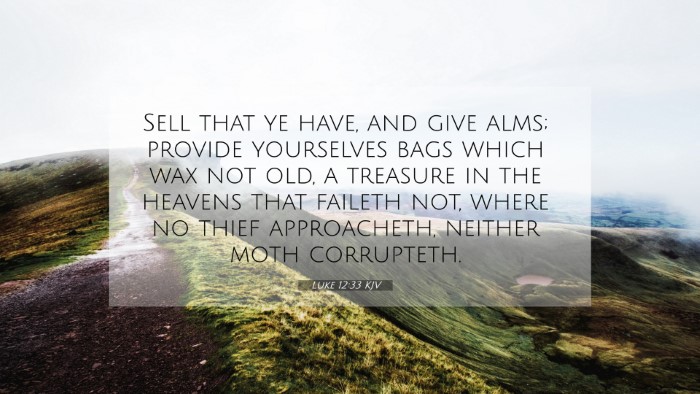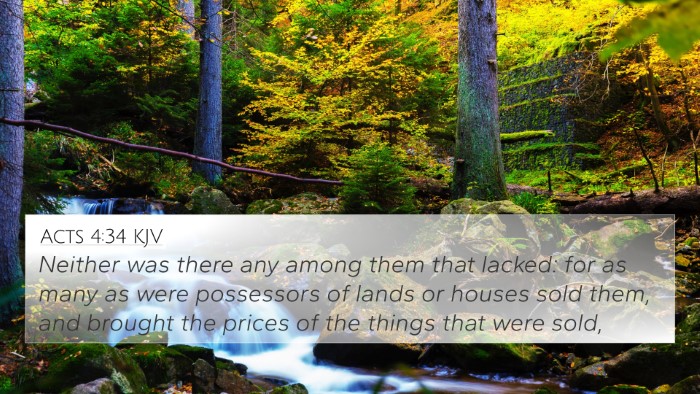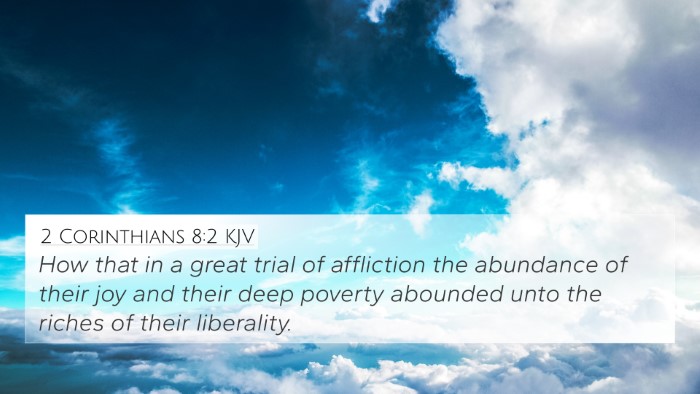Understanding Luke 12:33
Luke 12:33 states: "Sell what you have and give alms; provide yourselves money bags which do not grow old, a treasure in the heavens that does not fail, where no thief approaches nor moth destroys." This verse speaks to the idea of detachment from material possessions and encourages believers to invest spiritually rather than temporally.
Exegesis and Interpretation
This verse's meaning emphasizes the importance of selflessness, charity, and eternal rewards over earthly gains. By selling one's possessions to give alms, one is making a conscious choice to prioritize spiritual wealth. Public domain commentaries provide valuable insights into the implications of this teaching.
- Matthew Henry's Commentary:
Matthew Henry highlights the radical nature of Jesus’ command to sell possessions and give to the poor. He emphasizes that this does not mean a literal renunciation of all earthly goods but rather an attitude of generosity and readiness to part with material wealth for the sake of God's kingdom. Henry reflects on the eternal perspective that Jesus offers – that treasures in heaven are far more valuable than earthly treasures and are imperishable.
- Albert Barnes’ Notes on the Bible:
Barnes focuses on the concept of "money bags that do not grow old," interpreting this as a spiritual investment that yields eternal dividends. He explains that providing for oneself in terms of spiritual wealth means accumulating blessings that cannot be taken away or diminished. This ties into the theme of self-sacrifice and acts of love towards others, aligning with the broader biblical directive to care for the marginalized.
- Adam Clarke's Commentary:
Clarke elaborates on the idea that the act of giving alms reflects the character of God. He notes that such charitable actions not only help those in need but also signify one's trust in God's provision. Clarke connects this teaching to the broader context of Jesus’ ministry, which emphasizes the importance of loving one’s neighbor and fulfilling God’s commandments through action.
Connections to Other Bible Verses
Luke 12:33 resonates with various other passages within scripture, reinforcing its themes of generosity, eternal value, and spiritual richness. Below are some notable cross-references:
- Matthew 6:19-21: ("Do not lay up for yourselves treasures on earth, where moth and rust destroy and where thieves break in and steal; but lay up for yourselves treasures in heaven...") This passage parallels Luke 12:33 by urging believers to prioritize heavenly treasures over earthly ones.
- Acts 20:35: ("It is more blessed to give than to receive.") This verse echoes the teaching of giving and the blessings associated with selflessness.
- 1 Timothy 6:17-19: ("Charge them that are rich...that they do good, that they be rich in good works...") This passage emphasizes the responsibility of the wealthy to use their resources for good, reminiscent of the call to give alms in Luke 12:33.
- James 1:27: ("Religion that God our Father accepts as pure and faultless is this: to look after orphans and widows in their distress...") This reflects the ethical obligation to help those in need closely related to Jesus' command in Luke.
- 2 Corinthians 9:6-7: ("The point is this: whoever sows sparingly will also reap sparingly...") This teaching on generosity emphasizes that giving liberally results in blessings and affirms the importance of a cheerful heart in giving.
- Hebrews 10:34: ("For you had compassion on those in prison and you joyfully accepted the plundering of your property...") This passage speaks to the joy found in giving and suffering for the sake of others, affirming the spirit of Luke 12:33.
- Proverbs 19:17: ("Whoever is generous to the poor lends to the Lord, and he will repay him for his deed.") This verse emphasizes that acts of generosity are ultimately a service to God, aligning with the message in Luke about eternal treasures.
Thematic Connections and Comparative Analysis
In studying Luke 12:33 alongside the aforementioned verses, we dentify a common theme of valuing the eternal over the temporal. This theme runs throughout both testaments, reflecting a consistent biblical viewpoint on material wealth and spiritual investment.
Tools for Deeper Study
For those interested in exploring the connections between these verses more deeply, a variety of resources are available:
- Bible Concordance: An essential tool for locating specific verses and understanding their interconnections.
- Bible Cross-reference Guide: Guides that illustrate how verses are thematically linked can enhance understanding.
- Cross-reference Bible Study: Methods for studying scripture alongside related verses to glean deeper insight.
- Bible Reference Resources: Access to comprehensive platforms that compile thematic connections can aid in cross-referencing studies.
- Bible Chain References: Systems established to facilitate the study of interconnected verses can enhance comprehension.
Conclusion
In conclusion, Luke 12:33 calls believers to a profound understanding of generosity, echoing throughout scripture as a vital tenet of faith. By prioritizing heavenly treasures over earthly ones, Christians can partake in the lifelong journey of faith, drawing parallels and inspiration from interconnected verses. The tools for cross-referencing enhance this journey, allowing believers to discern the depth of God's Word and its transformative potential.















